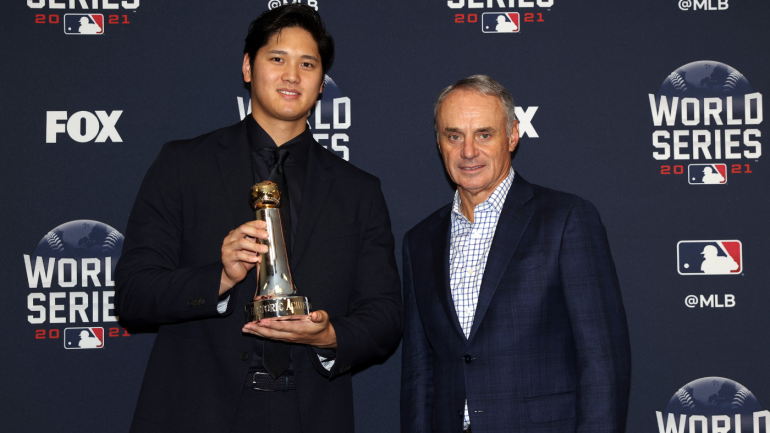
On Friday, Major League Baseball launched an investigation into Los Angeles Dodgers star Shohei Ohtani and the alleged "massive theft" committed by longtime friend and interpreter, Ippei Mizuhara. Mizuhara is said, through a series of wire transfers, to have stolen upwards of $4.5 million from Ohtani to cover gambling losses.
"Major League Baseball has been gathering information since we learned about the allegations involving Shohei Ohtani and Ippei Mizuhari from the news media," MLB announced Friday. "Earlier today, our Department of Investigations (DOI) began their formal process investigating the matter."
MLB has not placed Ohtani on the administrative leave or the restricted list, so he remains an active player.
Mizuhara is said to have placed bets with Mathew Bowyer, an illegal bookmaker in California. Bowyer is under federal investigation and Ohtani's name surfaced while the Los Angeles Times conducted its own investigation into Bowyer. The story broke on March 20, right after the Dodgers beat the Padres in the first regular-season game of the MLB season in Seoul, South Korea. Mizuhara was with Ohtani and the team on Wednesday before he was fired.
Now MLB is investigating the matter, along with the federal government's ongoing investigation into Bowyer. Here are the most pressing unanswered questions as the league's investigation gets underway:
Is either of Mizuhara's stories true?
Alternatively, why did Mizuhara tell two different stories? Initially, Mizuhara said he went to Ohtani for help, and Ohtani agreed to pay the gambling debts. Soon thereafter, Ohtani's lawyers said no, the money was stolen. Mizuhara then backtracked and said Ohtani was not aware of the payments. The two accounts could not be more at odds. Why did the story change and is either story true?
Did Ohtani send the payments?
Sports betting is illegal in California, so if Ohtani did send the payments to Bowyer, even unknowingly, he could find himself in trouble with the federal government. This could explain why the story was changed from "Ohtani helped out his friend and paid his gambling debts" to "the money was stolen." Ohtani's lawyers may have feared the initial story put him in jeopardy with the feds.
Furthermore, MLB Rule 21 expressly forbids players and team personnel from even associating with illegal bookmakers. Ohtani sending the payments to Bowyer would qualify as an association with an illegal bookmaker. The penalty for violating Rule 21 is at the discretion of commissioner Rob Manfred.
Did Ohtani place any bets himself?
Players and team personnel are forbidden from placing bets on baseball and softball, even legally. They can legally bet on other sports, however, and Mizuhara says he only bet on the NBA, NFL, NCAA basketball, and international soccer. Never baseball. Obviously, the league will investigate those claims. After all, Mizuhara's employment gave him access to inside baseball information that could potentially be used to place favorable bets.
MLB's investigation will no doubt look into whether Ohtani placed any bets himself. Legally, illegally, on baseball, on other sports, etc. The league will investigate it all. For what it's worth, Mizuhara has said Ohtani has never gambled and "thinks gambling is terrible," according to ESPN. MLB Rule 21 is posted in every big-league clubhouse. Betting on baseball is a massive no-no.
Can MLB compel Ohtani and Mizuhara to talk?
The league will surely request interviews with both Ohtani and Mizuhara, though their cooperation is not guaranteed. In Mizuhara's case, he is no longer employed by a team, so MLB can not force him to talk to their investigators. During an interview with ESPN, Mizuhara did say: "Obviously, this is all my fault, everything I've done. I'm ready to face all the consequences." That does not mean he will speak to league investigators, however.
As for Ohtani, he is a member of the MLB Players Association, and precedent says he can refuse to speak to investigators because a criminal investigation is underway. Ohtani is not believed to be the subject of the investigation, however, and MLB could argue he does not have the right to refuse cooperation under those circumstances. In short, the league can not force Mizuhara to speak to investigators, and the MLBPA will have a say in whether Ohtani must cooperate.
Will Ohtani be disciplined?
It's impossible to know right now. It will depend entirely on what the league's investigation turns up, and also the federal government's investigation. Criminal charges regarding payments to Bowyer would certainly open Ohtani up to MLB discipline, though they are not required for Manfred to hand down a suspension.
Here is MLB Rule 21:
Any player, umpire, or Club or League official or employee who places bets with illegal book makers, or agents for illegal book makers, shall be subject to such penalty as the Commissioner deems appropriate in light of the facts and circumstances of the conduct. Any player, umpire, or Club or League official or employee who operates or works for an illegal bookmaking business shall be subject to a minimum of a one-year suspension by the Commissioner. For purposes of this provision, an illegal bookmaker is an individual who accepts, places or handles wagers on sporting events from members of the public as part of a gaming operation that is unlawful in the jurisdiction in which the bets are accepted.
...
"Nothing herein contained shall be construed as exclusively defining or otherwise limiting acts, transactions, practices or conduct not to be in the best interests of Baseball; and any and all other acts, transactions, practices or conduct not to be in the best interests of Baseball are prohibited and shall be subject to such penalties, including permanent ineligibility, as the facts in the particular case may warrant."
That last clause, which is contained in Section (f) of Rule 21, is broad enough to cover all sorts of potential misconduct. In 2015, former major-league pitcher Jarred Cosart was found to have illegally bet on sports during his time as an active player, but not on baseball. Cosart was fined but not suspended.
Given the scope of the investigation and the seriousness of the matter, the various investigations figure to take some time. This is not likely to be something that wraps up swiftly. Here is more on MLB's history of gambling scandals.






















